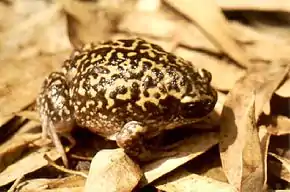Uperodon
Uperodon est un genre d'amphibiens de la famille des Microhylidae[1].
Uperodon

- Hyperodon Agassiz, 1846
- Cacopus Günther, 1864
- Pachybatrachus (Microhylidae) Keferstein, 1868
- Ramanella Rao & Ramanna, 1925
Répartition
Les douze espèces de ce genre se rencontrent en Asie du Sud[1].
Liste des espèces
Selon Amphibian Species of the World (4 avril 2020)[2] :
- Uperodon anamalaiensis (Rao, 1937)
- Uperodon globulosus (Günther, 1864)
- Uperodon minor (Rao, 1937)
- Uperodon montanus (Jerdon, 1854)
- Uperodon mormorata (Rao, 1937)
- Uperodon nagaoi (Manamendra-Arachchi & Pethiyagoda, 2001)
- Uperodon obscurus (Günther, 1864)
- Uperodon palmatus (Parker, 1934)
- Uperodon rohani Garg, Senevirathne, Wijayathilaka, Phuge, Deuti, Manamendra-Arachchi, Meegaskumbura, and Biju, 2018
- Uperodon systoma (Schneider, 1799)
- Uperodon taprobanicus (Parker, 1934)
- Uperodon triangularis (Günther, 1876)
- Uperodon variegatus (Stoliczka, 1872)
Taxinomie
Le genre Pachybatrachus[3] a été placé en synonymie avec Uperodon par Boulenger en 1882[4] et Ramanella[5] par Peloso et al. en 2015[6]. Hyperodon[7] et Cacopus[8] sont des noms de substitution superflus.
Publication originale
- Duméril & Bibron, 1841 : Erpétologie générale ou Histoire naturelle complète des reptiles, vol. 8, p. 1-792 (texte intégral).
Liens externes
- (en) Référence Amphibian Species of the World : Uperodon Duméril and Bibron, 1841 (consulté le )
- (en) Référence AmphibiaWeb : genre Uperodon (consulté le )
- (en) Référence Animal Diversity Web : Uperodon (consulté le )
- (en) Référence Catalogue of Life : Uperodon Duméril & Bibron, 1841 (consulté le )
- (fr+en) Référence ITIS : Uperodon Duméril & Bibron, 1841 (consulté le )
- (en) Référence NCBI : Uperodon (taxons inclus) (consulté le )
- (en) Référence UICN : taxon Uperodon (consulté le )
Notes et références
- Amphibian Species of the World, consulté lors d'une mise à jour du lien externe
- Amphibian Species of the World, consulté le 4 avril 2020
- Keferstein, 1868 : Über die Batrachier Australiens. Archiv für Naturgeschichte, vol. 34, no 1, p. 253-290 (texte intégral).
- Boulenger, 1882 : Catalogue of the Batrachia Salientia s. Ecaudata in the collection of the British Museum, ed. 2, p. 1-503 (texte intégral).
- Rao & Ramanna, 1925 : On a new genus of the family Engystomatidae. Proceedings of the Zoological Society of London, vol. 1925, p. 587-597.
- Peloso, Frost, Richards, Rodrigues, Donnellan, Matsui, Raxworthy, Biju, Lemmon, Lemmon, & Wheeler, 2015 : The impact of anchored phylogenomics and taxon sampling on phylogenetic inference in narrow-mouthed frogs (Anura, Microhylidae). Cladistics, p. 1–28.
- Agassiz, 1846 : Nomenclator Zoologicus Continens Nomina Systematica Generum Animalium tam Viventium quam Fossilium, Fasicle 12 (Indicem Universalem). Soloduri, Jent et Gassmann.
- Günther, 1864 : The reptiles of British India, p. 1-452 (texte intégral).
- Portail de l’herpétologie
- Portail de l’Asie
Cet article est issu de Wikipedia. Le texte est sous licence Creative Commons - Attribution - Partage dans les Mêmes. Des conditions supplémentaires peuvent s'appliquer aux fichiers multimédias.